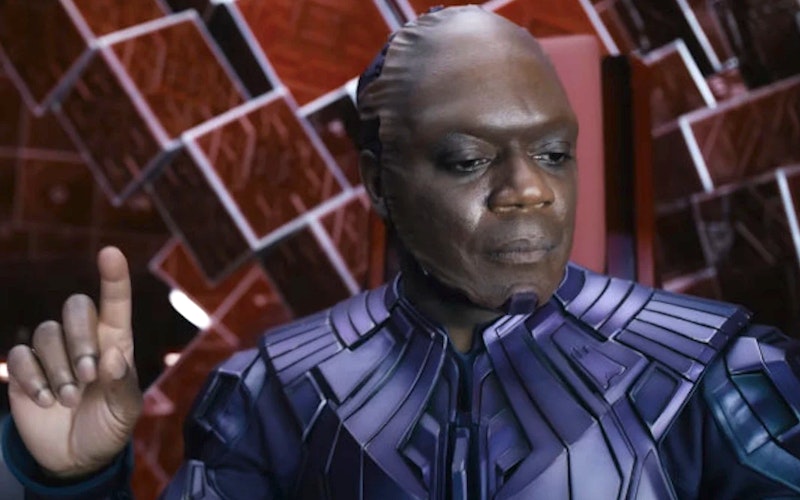
Movies
Guardians of the Galaxy Vol. 3 and the Power of Imperfection
The High Evolutionary cannot have what he wants.
Despite powers that allow the purple-suited supervillain of Guardians of the Galaxy Vol. 3 to create and destroy an entire species, he’s being thwarted by the cosmic misfits of the movie’s title. They fight to protect their teammate Rocket, a raccoon whom the High Evolutionary transformed into an anthropomorphic tech genius when Rocket was just a little kit. The High Evolutionary is so determined to retrieve the adult Rocket in Vol. 3 that, at one point, he puts his own ship and crew in danger.
“For god’s sake,” pleads one of the High Evolutionary’s scientists, begging her leader to stop the onslaught.
“There is no God!” he sneers back. “That’s why I had to step in.”
At first glance, the High Evolutionary’s retort is just another example of his megalomania. Played by a gloriously hammy Chukwudi Iwuji, the High Evolutionary is a character with no redeeming qualities, a villain in the truest sense of the word. Throughout Guardians of the Galaxy Vol. 3, he blithely tortures and kills animals, eradicating them even when they gain human levels of sentience.
One of the most striking examples occurs early in the film, during a flashback to Rocket’s youth. The young and recently augmented raccoon follows the High Evolutionary into a test chamber, where a technician places a box turtle into a glass enclosure. With the press of a couple of buttons, the turtle begins to mutate, taking a humanoid form. Writer-director James Gunn accentuates the painful nature of this process, filling the soundtrack with cracks and tears as the turtle’s limbs twist and grow, prompting the creature to unleash a roar of anger.
Watching this, the High Evolutionary remains quiet and somber, barely raising his head. These test subjects cannot grow to this level without becoming consumed by rage, he sadly explains. His sorrow comes not from the suffering he’s clearly inflicting on a living creature, nor even from the life of unhappiness he’s now given to his experiment. No, instead the High Evolutionary is sad because the anthropomorphized turtle disappoints him. He’s sad because he hasn’t found a solution to what he deems a problem. The High Evolutionary then presses another button and the enclosure fills with flames. The camera peers through the glass over the fire and at the villain’s face, his sorrowful features made satanic by the light thrown by the flames.
The High Evolutionary is clearly a bad guy, but what about our supposed heroes, the motley gathering of guardians: blithe leader Star-Lord (Chris Pratt), the bad-tempered Rocket (voiced by Bradley Cooper), cyborg Nebula (Karen Gillan), or living tree Groot (voiced by Vin Diesel)?
Sure, they’re the good guys, especially in contrast to the High Evolutionary, but they’re also messy and deeply imperfect. Consider a scene in which the Guardians land on Counter-Earth, a planet created by the High Evolutionary and populated with human-animal hybrids. Over the pounding base of “We Care a Lot” by Faith No More, the team emerges in slow motion from their enormous ship, which has landed in the middle of a mundane suburb filled with terrified residents. As Star-Lord tries to convince the denizens that he and his crew have come in peace, a young child bounces a ball over to Drax (Dave Bautista). Ever misunderstanding, Drax hurls the ball back at the girl, erupting in laughter as she falls over. A cacophony of shouts fills the soundtrack as the Counter-Earthlings hurl rocks at our heroes and Star-Lord tries to calm everyone down, a task made more difficult when Groot grows to kaiju-size and scares everyone away.
Five minutes into their mission, the Guardians have already screwed up.
As much as we might not want to admit it, Christians find something very relatable in this group of imperfect heroes—and perhaps also in the High Evolutionary. Despite our own foibles, we have our ideas of perfection and not only try to embody them ourselves, but also impose those expectations on others. Even the early church struggled with this tendency, employing ideas of perfection and holiness to exclude people from the community. Scripture includes several rebukes against such attitudes, none as forceful as a vision that Peter receives after refusing Gentiles participation in Christ’s church. Peter sees a cloth full of animals that his faith deemed unclean. When a voice told Peter to eat one of those animals, Peter held to his idea of perfection. “Surely not, Lord!” Peter replied. “I have never eaten anything impure or unclean.” But the voice corrected him, saying, “Do not call anything impure that God has made clean.”
We might balk at Peter’s temerity, going so far as to correct even God. But if we’re honest, we know how he feels. We’ve all held to our own ideas of perfection, insisting that others meet those standards, even if doing so runs contrary to God’s desires. We confuse goodness with our own perspective, instead of remembering God’s grace, which comes from a perfect love that drives out fear.
In these moments of confusion, we find ourselves relating to the High Evolutionary, imperious as he is. We can even behave as if there is no God and insist that we must step in and enforce certain standards. When we put ourselves in that position, we don’t just hurt others who need our love and mercy. We also miss out on being welcomed by a larger community.
Instead, we’d be better served by remembering that we are flawed do-gooders, much like the Guardians. And yet God loves us and uses us anyway. In the same way that the Guardians serve the galaxy despite their shortcomings, following God’s ways instead of our expectations allows us to be accepted, loved, and maybe even useful to the coming Kingdom.
Topics: Movies